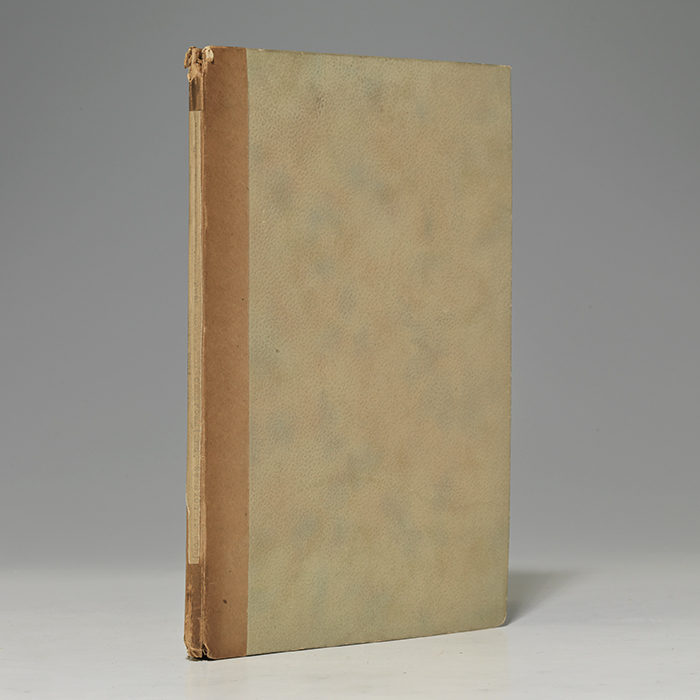
"WE ARE AT WAR… WAGED NOT IN VIOLATION OF THE RIGHTS OF OTHERS, BUT IN THE MAINTENANCE OF OUR OWN": PRESIDENT JAMES MADISON'S ELOQUENT FOURTH STATE OF THE UNION MESSAGE ON THE WAR OF 1812, WITH DIPLOMATIC CORRESPONDENCE INCLUDING THAT OF SECRETARY OF STATE & FUTURE PRESIDENT JAMES MONROE, AND AN 1811 LETTER FROM NAPOLEON
(MADISON, James) (U.S. CONGRESS). Message from the President of the United States to Both Houses of Congress At the Commencement of the Second Session of the Twelfth Congress. November 4, 1812. Read, and ordered to be printed… [including] Documents Accompanying the Message of the President… Washington: A. & G. Way, 1812. Octavo, original pale blue wrappers, uncut; pp. 86. $2000.
First edition, issued by official House printers, of Madison's powerful November 4, 1812 State of the Union Message to Congress on the War of 1812—"a watershed for the new nation… [with] a coming of age quality that has led many to call it a second war of independence"—containing extensive diplomatic correspondence between then-Secretary of State Monroe, along with an 1811 letter from Napoleon, a handsome uncut wide-margined copy, with original wrappers bound in.
When Madison, famed as the "Father of the Constitution," succeeded Jefferson to become America's fourth president, he had already done "more to shape the early nation's comprehension of its governmental institutions than any other member of his generation" (Banning, Sacred Fire, 9). "Among this nation's founders, only two were more important—Washington and Franklin." To historian Garry Willis, "as a framer and defender of the Constitution he had no peer" (James Madison, 164). As Jefferson's Secretary of State and as president, Madison believed "trade was a more powerful weapon than arms. Yet when he felt America's honor was compromised, he chose to fight" (Brookhiser, James Madison, 9). In declaring war against England in June 1812, Madison cited its maritime violations of impressments, blockades and seizures of neutral trade at sea, and also reasserted America's position with Canada. In this official printing of his fourth State of the Union Message, delivered November 4, 1812, he highlights these issues and memorably declares what many see as his signature conviction that the war's justification came from America's founding principles. "Above all," he states, "we have the inestimable consolation of knowing that the war in which we are actually engaged, is a war neither of ambition nor of vain glory; that it is waged, not in violation of the rights of others, but in the maintenance of our own… To have shrunk, under such circumstances… would have struck us from the high rank, where the virtuous struggles of our fathers had placed us, and betrayed the magnificent legacy which we hold in trust for future generations."
"In important ways, the War of 1812 truly was 'Mr. Madison's War.' It was about principles, not gain… In an era filled with military giants like Napoleon and the duke of Wellington, Madison would never cut a heroic figure… yet it was a watershed for the new nation… That the war involved challenging Britain, the former mother country, gave it a coming of age quality that has led many to call it a second war of independence. In the middle of the fight, John Adams insisted that a 'more necessary war was never undertaken'… America, stepping out on the world stage, had not distinguished itself, but it was still standing" (Stewart,
Madison's Gift, 265). After brothers Andrew and George Way centered their printing operations in Washington in 1804, they "very successfully lobbied for government printing" (
Journal of the House). This official House issue contains Madison's State of the Union
Message, and the accompanying
Documents, which include transcripts of extensive diplomatic correspondence, including that of Secretary of State and future president James Monroe, as well the translation of an April 1811 letter from Napoleon, who refers to a March 2nd Act of Congress that reinstated the 1809 policy of non-intercourse against Great Britain. Continuously paginated with separate title pages for
Message, pp. (i-iii) 4-14;
Documents pp. (15-17), 18-69, (70, folding chart), 71-86. Without final three leaves, containing the text of three minor letters, two of them presenting the third, about Danish responses to the situation. Published along with the R. C. Weightman Senate issue; no priority established. (
Message) Shaw & Shoemaker 27220. (
Documents) Shaw & Shoemaker 27139.
Text with light edge-wear; expert restoration to spine of original wrappers. Near-fine.